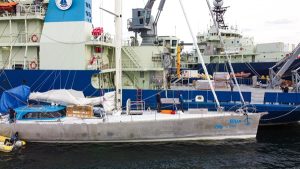NOAA & partners team with low-carbon sailing vessel for major deployment
 (NOAA.gov – read the full release) NOAA and partners have joined together to launch approximately 100 new Argo floats across the Atlantic ocean to collect data that supports ocean, weather and climate research and prediction. These will bolster the international Argo Program, which maintains a global array of about 3,800 floats that measure pressure, temperature and salinity of the upper 2,000 meters (1.2 miles) of the ocean.
(NOAA.gov – read the full release) NOAA and partners have joined together to launch approximately 100 new Argo floats across the Atlantic ocean to collect data that supports ocean, weather and climate research and prediction. These will bolster the international Argo Program, which maintains a global array of about 3,800 floats that measure pressure, temperature and salinity of the upper 2,000 meters (1.2 miles) of the ocean.
The French sailing vessel Iris arrived in Woods Hole, Massachusetts, this week after deploying the initial batch of 17 Argo floats across the Atlantic. While in Woods Hole, the S/V Iris crew will pick up the remaining floats for the second leg of the voyage in the South Atlantic, towards the island of St. Helena, off the coast of Namibia. The mission is one of the largest Argo float deployments in the Atlantic and is expected to last almost 100 days at sea, filling in crucial observing gaps.
This low-carbon research mission using an 82-foot sailing vessel was made possible through a new partnership between the private oceanographic company Blue Observer and international Argo Program partners from Woods Hole Oceanographic Institution, NOAA, Fisheries and Oceans Canada and Europe.
“Coming at a moment when we need meaningful action to tackle the climate crisis, this low carbon emission research mission sets a strong example for future ocean observing research,” said NOAA Administrator Rick Spinrad, Ph.D. “This voyage is a model of global public-private partnership that is helping us improve data that drive life-saving weather and climate forecasts.”
NOAA supports the Argo Program through the Global Ocean Monitoring and Observing Program and is one of several U.S. Argo partners.